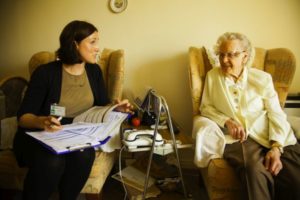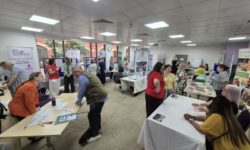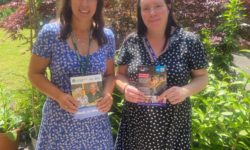As we get older our sense of thirst can reduce, but healthy older adults still need the same amount of fluid. If we don’t drink enough we can suffer from dehydration, which is common in older adults. Dehydration can make us feel tired, dizzy, and can affect memory and concentration.
Since 2015, our community nutrition team has screened hundreds of clients, 45 per cent of whom said, when asked, that they did not drink the recommended daily fluid intake of six to eight cups.
Food: the hidden hydrator
Food, often overlooked as a water source, supplies the average person in the UK with 20-30 per cent of the liquid they need― particularly if you choose fluid-rich foods like soup, or serve meals with a sauce such as gravy. The majority of your fluid (70 – 80 per cent) comes from drinks.
Try opting for foods high in moisture to maintain a good hydration status, such as:
- Cottage cheese
- Mashed potato
- Scrambled eggs with milk
- Baked beans
- Cauliflower cheese
- Houmous dip with vegetable sticks
Or for those with a sweet tooth*, why not try:
- Jelly
- Custard
- Yoghurts
- Ice lollies
- Porridge
*Delicious low fat/ sugar options available

Annabelle says:
“Adding certain foods to your diet can contribute to your overall hydration – soup, fruits, and vegetables, all contain more than 80 percent of water!
In my role at HILS, the UK’s largest charitable meals on wheels service, I help to design menus to ensure a variety of balanced and nutritious meals. Some of our meals have more fluid than others. Many contain the equivalent of more than two cups of tea (over 340ml)! These include our Gammon and Mushroom Pie, Macaroni cheese, Salmon Crumble, and Lemon and Ginger Chicken. If you are cooking at home, salads, stews and curries are also good meals for high fluid content.”
Don’t wait, hydrate!
Try to have at least one nourishing drink each day, such as a glass of milk or a milky coffee. Remember, all non-alcoholic drinks – whether it’s water, tea, squash, or milk – can help keep you healthy. Tea and coffee are useful sources of fluid, even though they contain caffeine. Despite what you may have heard, caffeine does not affect hydration when drunk in moderate amounts, so try balancing out your hot beverages with non-caffeinated drinks.
“We need to drink more when the weather is warm, or if your heating is turned up, as this causes you to lose more water through evaporation. There are added benefits too – a small glass of juice counts as 1 of your 5 a day! At HILS, we encourage our clients to drink by filling up water jugs, or making a cup of tea to drink alongside our meals on wheels” adds Annabelle.
Getting up in the middle of the night to go to the loo isn’t fun! What can we do to help prevent this?
- Drink plenty early in the day, increase fluid rich foods such as fruits, soups etc.
- Often people drink less over the day to avoid getting up at night and end up getting dehydrated. But concentrated urine can irritate the bladder and unfortunately make you feel like you need the loo anyway.
- Fun fact: If well-hydrated, your urine should be the colour of pale straw!
Support available:
Dehydration is a dangerous condition which can lead to other health conditions, such as constipation and urinary tract infections (UTIs). If you’re experiencing continence issues, your GP may be able to refer you to a local bladder and bowel nurse to ensure you have all the support you need.


